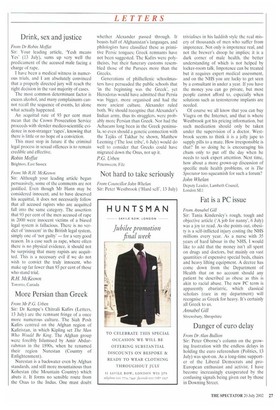More Persian than Greek
From Mr P. G. Urben
Sir: Dr Kempe's Chitrali Kafirs (Letters, 13 July) are the remnant fringe of a once more numerous culture. The Siah Posh Kafirs centred on the Afghan region of Kafiristan, in which Kipling set The Man Who Would Be King. The Afghan group were forcibly Islamised by Amir Abdurrahman in the 1890s, when he renamed their region Nurestan (Country of Enlightenment).
Nurestan is a backwater even by Afghan standards, and still more mountainous than Kohestan (the Mountain Country) which abuts it. It forms no sensible route from the Oxus to the Indus. One must doubt whether Alexander passed through. It boasts half of Afghanistan's languages, and philologists have classified these as primitive Persic tongues; Greek remnants have not been suggested. The Kafirs were polytheists, but their funerary customs resembled those of the Parsees more than the Greeks.
Generations of philhellenic schoolmasters have persuaded the public schools that 'in the beginning was the Greek', yet Herodotus would have admitted that Persia was bigger, more organised and had the more ancient culture. Alexander ruled both. We should recognise that Alexander's Indian army, thus its stragglers, were probably more Persian than Greek. Nor had the Achaeans long been in the Greek peninsula, so even should a genetic connection with the Tajiks of Takhar be shown, Matthew Leeming (The lost tribe', 6 July) would do well to consider that Greeks could have migrated down the Oxus, not up it.
P. G. Urben Pittenweem, Fife


























































 Previous page
Previous page